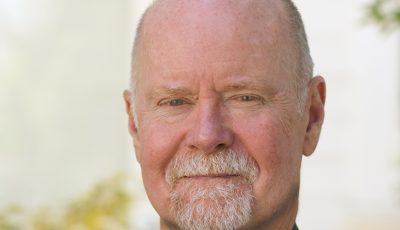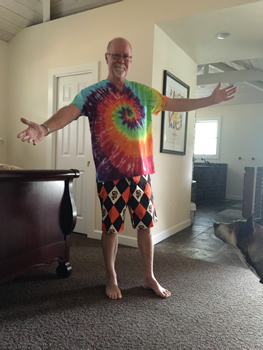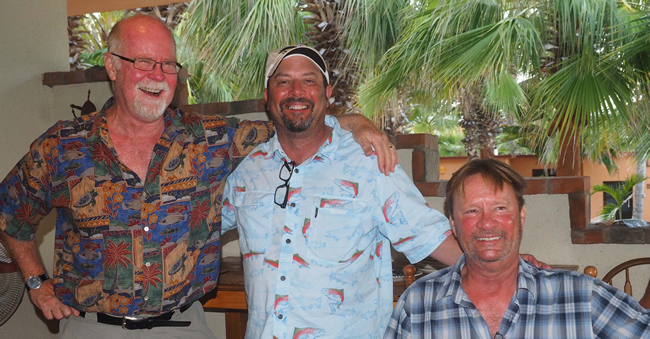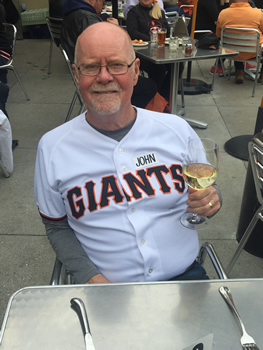

Between the Lines: John Lescroart
Finding the Echoes of Betrayal
 By James Ziskin
By James Ziskin
Themes of betrayal, dishonesty, and infidelity are at the heart of John Lescroart’s latest novel, FATAL. Not something one would necessarily expect from one of the nicest guys you’ll ever meet. Yet he manages to plumb the depths of human selfishness and sin with an assured hand.
Lescroart is the New York Times bestselling author of 26 novels, including the Dismas Hardy series of legal and crime thrillers. His books have sold more than 10 million copies worldwide and have been translated into more than 20 languages. He has been nominated for the prestigious Anthony and Shamus awards and won the Book of the Year from the American Authors Association in 2007 for The Suspect. He was the 2012 guest of honor at Left Coast Crime, and most recently received the Silver Bullet Award from the International Thriller Writers for his work promoting literacy. Besides being a bestselling author of thrillers, Lescroart is a talented musician/songwriter, with hundreds of works to his credit.
His latest ovel is a departure from his bestselling Dismas Hardy series. FATAL is a standalone thriller that deftly straddles a variety of subgenres. Lescroart presents the story of lives spiraling out of control as the result of a single indiscretion. It’s a compelling crime novel/domestic thriller that confronts readers with tough questions on fidelity, marriage, and responsibility. FATAL is a cautionary tale, a police procedural, and modern-day morality play rolled into one.
I had the honor of talking to John Lescroart about FATAL, his successful career, his made-it moment, and even his music.
A single act of infidelity is the catalyst that sets fateful, almost inevitable consequences in motion. There’s an element of Greek tragedy to FATAL. It’s quite effective and compelling. Can you talk a bit about the themes of transgression in this book?
Perhaps because of my Roman Catholic upbringing, I have always been drawn to classical, even Biblical themes. In fact, I would be hard pressed to remember any book of mine that did not find its genesis in the power of its theme, not its plot. FATAL took this natural predilection to a whole new level. From the outset, I knew I would be trying to bring a universal quality to this story—it’s a large part of why I abandoned my old familiar Dismas Hardy world, and decided to work with an entirely fresh cast of characters. I knew I was going to be working with the classical themes of sin, guilt, transgression (as you say), and redemption. While remaining specific to my characters and plot, I wanted this book to feel big, to feel like it included the whole wide world because of the universality of its themes. Without including any spoilers here, the repercussions of that one single act of infidelity alters not only a myriad lives but the internal landscape of the city of San Francisco itself.
When you plot your books, where do you start? With a kernel of an idea? A crime, or a setting?
This book began with a sense of panic. Originally, because of the thematic issues discussed above, I knew that I wanted to be working with new characters and a new setting, taking a break from Dismas Hardy and the “legal thriller” world. Unfortunately, after I’d written close to 100 pages of that story, I realized that it wasn’t working. And time on my deadline was still ticking away! So, in desperation, I jettisoned the early pages and decided to just start over with a plot idea that was simple but inherently laden with conflict and moral ambiguity—not a crime so much as a sin. So, I wrote the first scene, and suddenly my characters came to life there on the first page, and I followed them as they led me down the dark and twisting path that became the arc of the book.
Beth Tully is a thoroughly likeable heroine. An understated, believable, tough, savvy, empathetic cop, she’s the star of FATAL. Where did you find her?
Beth played a little bit hard to get. When she first appeared on the page, not only didn’t I realize that she was going to be a major player in the story, I didn’t even know that she was a cop! At the time, I was concentrating on her friend Kate, who would be the catalyst for so much of the thrust and misery in the novel, and Beth was mostly a vehicle through which the reader might understand what is going on with Kate. Then, as real life will do, events in the story begin to mold Kate into the tough, savvy, and empathetic person she’s always been—deep down. I think that one of FATAL’s great pleasures is Beth’s development, born in quite literal fire, into a pro-active and fully adult heroine.
Have you given any thought to creating a series for her?
My wonderful editor, Peter Borland of Atria Books, and my agent, Barney Karpfinger, have both mentioned this idea more or less in passing, and since they are both insightful, creative, and intelligent guys, I would be foolish to disregard their inclinations. These types of decisions, though, usually go through a series of iterations before they become set in stone. I’ve already finished my next novel after FATAL, and in it I’m back with Dismas Hardy and his gang. So whether or not I get back to Beth Tully as a lead character in another book, that book probably wouldn’t be published until 2019! So, I’d have to say that there isn’t at the moment a great sense of urgency. We’ll just have to wait and see how things pan out.
A dramatic, frighteningly believable, and topical plot point occurs midway through the story arc of FATAL. Without spoiling any surprises, can you discuss the emotional punch of this unexpected turn of events?
All I can say, not to be too great a tease, is that this event was a total surprise to me, unimagined even as I started writing the scene. And in some grand, karmic way, it suddenly became the prism through which the rest of the book got written. I can’t explain it more fully than that, since it was a totally unplanned, even unconscious moment, and I recognized that it had to stay, since it immediately elevated the book into something very different from anything I’d written before.
Is FATAL police procedural, crime fiction, or domestic thriller?
Is it fair to say that the correct answer is (c) all of the above?
You write with great authority suspense, legal thrillers, and mystery. I know you’re not a lawyer or a cop. So how do you manage to nail these genres so accurately? Tell us how you research.
Well, although the word “research” conjures up overtones of paper and web searches, the plain truth of the matter is that nothing compares to boots on the ground and first-hand interviews with professionals on any of a host of questions. I haven’t written a book in more than 20 years where I didn’t go down to the physical locale where the story was set, where I didn’t talk to various experts in person (whether they were police officers, or judges, or doctors, or forensic accountants, or whatever), where I didn’t eat in the same restaurants as my characters. And this just in: people generally love to talk about what they do for a living. One of my favorite research techniques, where I figuratively kill two or more birds with one stone, is to invite professional law enforcement personnel to lunch or dinner at one of the restaurants my characters frequent. At those luncheons, perhaps over a cocktail or two, many secrets get revealed.
In all your books, you do a very effective job on police and legal procedures without bogging down the story. What’s the secret? How do you balance realism with pacing?
To oversimplify, and though it may seem glib, there is no way to overestimate the importance of clarity and language. I pay very close attention to the actual words I use. Even after you’ve done your research, even if you have the greatest plot twists on the planet, even if your verisimilitude is unassailable, nobody’s going to want to read about it unless your words sing; unless your antecedents are clear; unless you’ve got some humor and wordplay; unless you use the active voice; unless you avoid writing just plain old yucky prose. It’s all about the actual writing. That’s the whole secret, such as it is, exposed and unadorned.
With The Fall, you’ve written 18 Dismas Hardy novels. And you’ve brought his daughter, Rebecca, into the firm. Tell us how you keep a series fresh and exciting through so many cases.
All you have to do is live in a perpetual state of despair that you’ll never have another good idea. No, but seriously . . . well, actually, it is seriously. I try to surprise myself with the life turns my characters go through. Setting these books in “real time” helps. People get older, their kids grow up; people die or get killed or move away or change jobs. Just like in real life. I try to avoid becoming chained to what my characters have always done in the past — they’re moving along, often just muddling through, just like we all do, and I think that this helps my readers feel empathy and connection with these characters, who are hopefully very much like “real” people. As to the legal cases, all one need do is stay aware of the world around us, which unfortunately provides all the examples of heinous criminal and immoral behavior that we’ll ever need.
Will we see more of Rebecca in future Dismas Hardy books?
I admit that Rebecca does appear in the next book after FATAL. So, she is definitely still in the mix. I’m not currently planning on having anything particularly dramatic happening to her, but again, you never know—she might move to Montana and marry one of CJ Box’s characters.
Let’s pause on the writing for a moment to discuss your music. Very unexpected to find a New York Times bestselling author writing and performing such great music. Tell us a bit about your music and what’s new on the horizon?
Well, I’ve been serious about music since I was in high school. I started writing my own songs as soon as I’d learned three chords, and I’ve kept up with it through today. Until I was 30, I made my living as a singer/guitarist, finally forming an Eagles-type band called Johnny Capo (me) and his Real Good Band. It was a lot of fun, but the record deal never materialized and I finally decided to try an easier way to make a living —writing novels! But still, the songwriting bug never really went away. I’ve probably written 500 songs, a hundred of which aren’t really too bad. Just this month, Tommy Lee Moffat, a country singer in California’s Central Valley, released a CD of all of my music. Entitled “Dixie Sunshine,” it’s available on CD Baby and all the other normal venues, such as Spotify, etc. He wants me to play rhythm guitar in his traveling band, but I think I’m going to pass. Oh, and I am making my first guitar with master luthier Al Calderon in Winters, California.
Readers always enjoy hearing about successful writers made it. Can you tell us about your moment?
Sure. I was 45 years old, sitting at my desk working on my eighth novel (A Certain Justice), when the telephone rang on my desk. In the last year, Donald I. Fine had bought The 13th Juror and planned to publish it in the next month or two. Unknown to me, though, he also had put that book out to auction in the paperback market. Mr. Fine and I had had a bit of acrimony with contracts and other issues over the years, and normally a call from him was not a cause for joy. Nevertheless, when I picked up the phone, his assistant said, “Hold please for Mister Fine,” and I took a breath, gearing myself up for whatever it might be. When he came on, he asked me if I were sitting down, and if not, maybe I’d want to. I told him I was already sitting, and he told me that he’d just sold the paperback rights on The 13th Juror to Dell Books for $300,000. I’d have to say that that was the moment I thought that this whole crazy career was going to work out after all.
Last July, the International Thriller Writers awarded you the Silver Bullet (to recognize outstanding and meritorious achievement in the pursuit of literacy and the love of reading). I was there and cheered with the other writers and fans in the ballroom. It was a great moment. What can you tell us about it?
Receiving the Silver Bullet award was one of the most unexpected and wonderful moments of my life. This is the kind of thing that I don’t think anyone ever plans for or, really, thinks that they deserve. And I am squarely in that camp. I’m just so grateful that I’ve been able to make a good living doing something I love and that perhaps I’ve been able to help some others along the way. The recognition by the ITW was icing on this already very sweet cake.
What’s next for John Lescroart?
Let’s see, FATAL goes to #1, “Dixie Sunshine” tops the Billboard 100 . . . But really, I hope to keep doing what I’m doing. As I mentioned, I’ve already got my 2018 book finished, so now I’m casting about for ideas for the 2019 book (Beth Tully? Dismas Hardy? The great unknown?) Also, I’m enjoying my tenure as co-president of the ITW, and I expect to have more good times in that position. Meanwhile, life is good and I plan to enjoy it and keep doing some good for as long as I can.
- On the Cover: R. G. Belsky - April 30, 2019
- Between the Lines: John Lescroart - January 31, 2017
- No One Knows by J.T. Ellison - March 31, 2016




